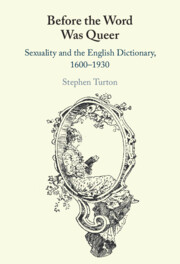Book contents
Conclusion
Looking beyond the Queer and Now
Published online by Cambridge University Press: 14 March 2024
Summary
This chapter looks beyond the temporal scope of the rest of book to the legacy of the OED’s empirical principles for contemporary dictionaries. The chapter argues that there are limitations inherent in any lexicographical model whose aim is to document a language as it is commonly and widely used. Though this ‘majority rule’ approach may seem democratic, it cannot help but marginalize people whose practices or identities—and the language by which they express them—diverge from dominant norms. While digital advances have enabled new ways of making dictionaries, from corpus-building to online crowdsourcing, these have not allowed lexicographers to evade the ideological pitfalls that surround the documentation of ‘minority usage’, whether present or past. The chapter closes with a reflection on the future of historical research into language and sexuality, both within the dictionary and beyond it.
Keywords
- Type
- Chapter
- Information
- Before the Word Was QueerSexuality and the English Dictionary, 1600–1930, pp. 176 - 197Publisher: Cambridge University PressPrint publication year: 2024

